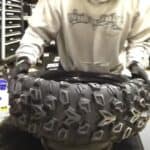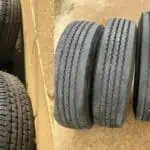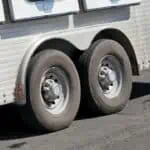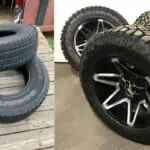If you’re shopping for new tires for your trailer, you may be wondering if wider tires are better. The answer isn’t necessarily straightforward, as there are a few factors to consider. Here’s a look at some of the pros and cons of wider trailer tires to help you make the best decision for your needs.
Are wider trailer tires better? It’s a question that many people ask, but there isn’t necessarily a clear-cut answer. There are pros and cons to both wider and narrower tires, so it really depends on your individual needs and preferences.
Wider tires may provide more stability and traction, especially in wet or icy conditions. They can also help to distribute the weight of your trailer more evenly, which can be beneficial if you’re carrying a heavy load. On the downside, wider tires can be more expensive and may require special rims.
They can also be more difficult to maneuver in tight spaces.
Narrower tires may be less expensive and easier to maneuver than wider ones. They can also be less likely to get caught in potholes or other road hazards.
However, they may not provide as much stability or traction as wider tires, particularly in adverse weather conditions.
Ultimately, the best tire width for your trailer depends on your specific needs and preferences. If you frequently travel in inclement weather or carry heavy loads, you may want to opt for wider tires.
If cost is a primary concern or you don’t anticipate encountering many challenging driving conditions, narrower tires may suffice.
You May Like
- Set of 4 New Premium Radial Trailer Tires 225/75R15 10PR, Brand: FREE COUNTRY
- Full cap ply ( nylon overlay cross entire tread area), significant upgrade from most other…
- Featured “Scuff Guard” ring on tire wall for better tire side protection
- 7 mm deep tread depth vs 5.6 mm of other cheap competitors, has longer mileage life
- 2 new premium full nylon cap ply 8PR ST205/75R15 Radial trailer tires, brand: FREE COUNTRY
- Full nylon cap ply ( nylon overlay cross entire tread area), significant upgrade from most…
- Featured “Scuff Guard” ring on tire wall for better tire side protection
- 7 mm deep tread depth vs 5.6 mm of other cheap competitors, and longer mileage life
- Premium FREE COUNTRY Heavy Duty 10 ply rated, load Range E, 2400LBS capacity!
- FULL nylon cap ply overlay cross entire tread area, significant upgrade from most other…
- Featured “Scuff Guard” ring on tire wall for better tire side protection
- This tire is designed for the trailer use only, rims are not included.
- Set of 2 New ST205/75D15 Bias Tires, (tires only), Brand name: Free Country
- 6 Ply, load range C. Rim width: 5.5″ (rims not included)
- Max. Load: 1,820lbs @ 50 psi, Deeper tread, longer life
- Designed for trailer use only, no rims included
- Treadlife: N/A
- Tires Only
- Season: All Season, Performance: Highway
- Car Type: Trailer
Are Wider Trailer Tires Better?
Does Trailer Tire Width Matter?
When it comes to trailer tires, width does matter. The reason is because a wider tire will provide better stability and tracking, which is essential when hauling a heavy load. A wider tire also has a larger contact patch with the ground, which means more traction.
And in general, wider tires are simply tougher and more durable than narrower ones.
Of course, there are trade-offs. Wider trailer tires can be more expensive and may not fit on certain rims.
They also tend to weigh more than narrower tires. But if you have the budget and your trailer can accommodate them, wider trailer tires are definitely the way to go.
Do Wider Tires Help With Trailer Sway?
If you’re towing a trailer, you’ve probably experienced some degree of sway. Sway is the side-to-side movement of the trailer that can occur when wind or a passing vehicle hits it. While some amount of sway is normal, too much can be dangerous and lead to an accident.
There are several ways to combat trailer sway, but one of the most effective is to use wider tires. Wider tires provide more stability and grip on the road, which helps to keep the trailer in line. They also help to distribute the weight of the trailer more evenly, which further reduces sway.
If you’re considering using wider tires on your trailer, be sure to consult with a qualified technician to ensure that they’re compatible with your particular setup. Once installed, take some time to get used to them before hitting the open road. With proper care and attention, wider tires can help you avoid dangerous situations and arrive at your destination safely.
Is It Better to Have Wider Or Taller Tires?
The debate between wider and taller tires is one that has been around for a while. Each has its own advantages and disadvantages. Here’s a look at the pros and cons of each to help you decide which is best for your vehicle.
Advantages of Wider Tires:
-Wider tires provide better grip on the road, which can be beneficial in wet or icy conditions.
-They also offer improved handling and stability.
-Wider tires can give your car a more aggressive stance and can make it look more muscular. Disadvantages of Wider Tires:
-Wider tires can be more expensive than tall ones.
-They also require special rims that may not be compatible with your car’s current setup.
-Wide tires can cause increased wear on suspension components due to their added width and weight. They can also add unsprung weight to your car, which can negatively affect performance.
Advantages of Taller Tires:
-Taller tires are typically cheaper than wider ones. -They’re also lighter, which means they won’t add as much unsprung weight to your car as wider tires will. This can improve performance slightly since there’s less weight for the suspension to control.
-Taller tires can provide better fuel economy due to their lower rolling resistance. Disadvantages of Taller Tires:
-Taller tires offer reduced grip compared to wider ones since there’s less contact patch with the ground. This can be an issue in slippery conditions or when cornering at high speeds.
-They also tend to have poorer handling characteristics since they’re narrower and have less contact with the road surface.
What are the Disadvantages of Wider Tires?
While wider tires have many advantages, there are some disadvantages to consider as well. Wider tires can be more expensive and may not be compatible with all wheels. They also can add weight to the vehicle, which may impact fuel economy.
Additionally, they may not provide as much grip in icy or snowy conditions.
Are Wider Tires Better for Towing
There is a lot of debate out there about whether wider tires are better for towing. The truth is, it really depends on your specific situation. If you frequently tow heavy loads, then wider tires may be a good option for you.
They will provide more stability and traction, which can be helpful when hauling a trailer. However, wider tires can also add additional weight to your vehicle, which can negatively impact fuel economy. So if you don’t regularly tow heavy loads, you may want to stick with standard tires.
Ultimately, the best way to determine what width tire is right for you is to consult with your local automotive specialist.
Trailer Axles And Tires Flex During Turning
As anyone who has ever driven a vehicle with a trailer attached knows, turning can be a bit tricky. The reason for this is that the trailer axles and tires flex during turning, which can cause the trailer to veer off course. This is why it’s important to take extra care when making turns, and to always use proper turn signals so that other drivers are aware of your intentions.
There are a few things that you can do to help prevent your trailer from veering off course. First, make sure that the tires on your trailer are in good condition and properly inflated. Secondly, if your trailer has brakes, make sure they are in good working order before setting out on your trip.
Lastly, go slowly when making turns and give yourself plenty of room to maneuver. By following these simple tips, you’ll be able to keep your trailer under control while on the road.
Travel Trailer Uneven Tire Wear
If you have a travel trailer, you may notice that your tires wear down unevenly. This is because the weight of the trailer is not evenly distributed. The tongue of the trailer is usually heavier than the rest of the trailer, so it puts more pressure on the tires in front.
To avoid this problem, you can redistribute the weight in your trailer by moving things around. Put heavier items closer to the center of the trailer and lighter items towards the back or sides. You can also try to distribute the weight evenly between all four tires.
If your tires are already wearing down unevenly, you can try to rotate them so that they all wear down at the same rate. However, if there is too much difference in tire wear, you may need to replace one or more tires.
Why Do Trailers Have Small Wheels
If you’ve ever wondered why trailers have small wheels, you’re not alone. It’s a question we get asked a lot, and it’s one that has a pretty simple answer. Trailers are designed to be pulled by larger vehicles, so the wheels need to be smaller in order to match the size of the vehicle.
This ensures that the trailer can be easily towed without putting too much strain on the vehicle.
Smaller wheels also make it easier for trailers to maneuver around tight corners and navigate narrow roads. This is especially important for RVs and campers, which often have to travel down winding mountain roads or through crowded city streets.
So there you have it! The next time you see a trailer with small wheels, now you’ll know why they’re that way.
What Causes Cupping on Trailer Tires
If you’ve ever noticed strange marks on the side of your trailer tires, you may have wondered what causes cupping. Cupping occurs when the tire tread wears in an uneven pattern, causing it to form a cup-like shape. This can happen for a variety of reasons, but is most often caused by improper inflation or alignment.
Improper inflation is perhaps the most common cause of cupping. When a tire is underinflated, the weight of the trailer puts more force on the parts of the tire that are in contact with the ground. This causes those areas to wear down faster than the rest of the tire, leading to cupping.
Alignment issues can also cause cupping. If your trailer’s axles are not aligned properly, it can put extra strain on certain areas of the tires as they rotate. This too will eventually lead to uneven tread wear and cupping.
Of course, there are other potential causes of cupping as well, such as hitting a curb or pothole hard enough to damage the tire treads. But in most cases, improper inflation or alignment are to blame.
So if you notice anycupping on your trailer tires, be sure to check their pressure and alignment first.
Making sure these things are in order will help prolong the life of your tires and keep them rolling smoothly down the road.
Bigger Rv Tires
RV tires are designed to provide a smooth, comfortable ride for RVers and their passengers. They are also built to withstand the rigors of the road, including potholes, rocks, and other obstacles. But as with any tire, they will eventually wear out and need to be replaced.
When that time comes, you’ll need to decide whether to stick with the same size tires or upgrade to larger ones.
The main advantage of upgrading to larger RV tires is increased stability. Larger tires provide a wider contact patch with the ground, which gives your RV more traction and makes it less likely to rollover in an accident.
They also make your RV less susceptible to being blown off course by strong crosswinds.
Another benefit of larger RV tires is that they can improve your gas mileage. That’s because they have less rolling resistance than smaller tires, which means they require less energy (and fuel) to keep them moving down the road.
In addition, they tend to last longer than smaller tires because they don’t experience as much tread wear.
Of course, there are some drawbacks to upgrading to larger RV tires. The most obvious one is cost –larger tires generally cost more than smaller ones.
Additionally, your RV will be heavier with larger tires, which could impact its handling and braking performance (although this can be mitigated somewhat by choosing lighter-weight models). And finally, you’ll need a bigger space in which to store your spare tire when you’re not using it (most RVs come with one spare tire; two would be even better).
If you’re considering upgrading your RV’s tires, weigh the pros and cons carefully before making a decision.
How to Put Bigger Tires on a Trailer
If you have a trailer that you frequently use to haul large items, you may eventually want to upgrade the tires to something bigger and beefier. This is a fairly straightforward process that anyone with basic mechanical skills can do in their own driveway. Here’s a quick guide on how to put bigger tires on your trailer.
First, you’ll need to measure the width of the existing tire’s tread. Most trailers use 15-inch or 16-inch tires, but you may have a different size depending on the model and year. Once you know the width,you can purchase new tires that are at least 2 inches wider than the old ones.
It’s important not to go too much wider than this, as it could cause problems with clearance and stability down the road.
Next, remove the old tires from the rim by loosening the lug nuts and gently prying them off. You may need a tire iron or similar tool to help with this step.
Once the old tires are off, clean up any rust or debris from the rims before putting on the new tires. Make sure they’re seated properly on the rim and then hand-tighten each lug nut before using a power drill to finish tightening them. That’s it!
Conclusion
Are Wider Trailer Tires Better?
Wider trailer tires may provide some benefits over traditional narrow tires, but they also have some drawbacks that should be considered. Wider tires can offer increased stability and tracking, as well as a smoother ride.
However, they can also be more expensive and may not fit all trailers. Ultimately, the best choice of tire width will depend on the specific needs of the trailer and its owner.














